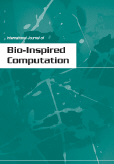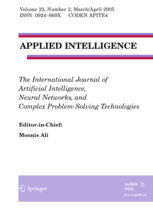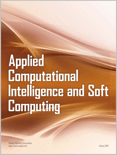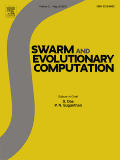
International Journal of Bio-Inspired Computation
Scope & Guideline
Exploring Nature's Wisdom in Computational Innovation
Introduction
Aims and Scopes
- Bio-inspired Optimization Algorithms:
The journal emphasizes research on optimization algorithms that draw inspiration from biological processes, such as genetic algorithms, ant colony optimization, and swarm intelligence. These algorithms are applied to solve complex problems across various domains. - Machine Learning and Deep Learning Applications:
A significant focus is placed on the integration of bio-inspired methods with machine learning and deep learning techniques. This includes neural networks, evolutionary algorithms for model optimization, and various hybrid approaches that enhance predictive capabilities. - Interdisciplinary Research:
The journal promotes interdisciplinary approaches, combining insights from biology, computer science, engineering, and other fields to address complex challenges, particularly in areas like healthcare, environmental science, and cybersecurity. - Real-world Problem Solving:
Research published often addresses real-world applications, showcasing how bio-inspired computation can be leveraged to solve practical problems in domains such as agriculture, energy conservation, and medical diagnostics. - Theoretical Foundations of Bio-inspired Computation:
The journal also explores the theoretical underpinnings of bio-inspired algorithms, including their mathematical modeling, convergence analysis, and performance metrics, contributing to the foundational knowledge in this rapidly evolving field.
Trending and Emerging
- Integration of AI with Bio-Inspired Techniques:
There is a notable trend towards integrating artificial intelligence (AI) with bio-inspired algorithms, particularly in the context of deep learning and neural networks. This hybridization enhances the capabilities of traditional bio-inspired methods, leading to more effective solutions in various applications. - Focus on Sustainable Solutions:
Recent papers emphasize sustainable practices, particularly in agriculture and energy management. For example, studies on crop recommendation systems and energy conservation in water pump stations highlight the journal's commitment to addressing global challenges through bio-inspired computation. - Enhanced Security Applications:
The journal is increasingly publishing research focused on cybersecurity, including intrusion detection systems powered by bio-inspired methods. This trend reflects the growing importance of securing digital environments in an era of increasing cyber threats. - Health and Medical Diagnostics:
There is a rising interest in applying bio-inspired computation to healthcare, particularly in medical image analysis and disease detection. Innovations in algorithms for diagnosing conditions like diabetic retinopathy and lung diseases are indicative of this trend. - Complex System Modeling:
Emerging themes include modeling complex systems using bio-inspired approaches, such as collective intelligence and swarm behavior. This trend indicates a shift towards understanding and simulating complex interactions within biological and artificial systems.
Declining or Waning
- Traditional Evolutionary Algorithms:
While evolutionary algorithms remain relevant, there has been a noticeable decline in papers solely focused on traditional methods without integration into hybrid frameworks. This suggests a shift towards more innovative approaches that combine different methodologies. - Basic Applications in Simple Optimization Problems:
Research that addresses straightforward optimization problems without substantial complexity is becoming less prevalent. The journal appears to be favoring studies that tackle more intricate and multifaceted challenges that require advanced algorithms. - Single-Domain Focus:
There is a reduction in studies that concentrate solely on one domain (e.g., only focusing on optimization in computer vision). Instead, interdisciplinary and multifaceted applications are gaining traction, indicating a preference for broader applicability. - Static Problem Formulations:
The journal has seen fewer publications on static optimization problems. Instead, dynamic and adaptive problem-solving approaches that reflect real-time changes in environments are becoming more prominent, reflecting the need for more robust solutions. - Overemphasis on Algorithmic Performance Metrics:
While performance metrics remain important, there is a reduced focus on papers that solely discuss algorithmic efficiency without practical applications or implications, suggesting a shift towards more application-driven research.
Similar Journals

APPLIED INTELLIGENCE
Transforming ideas into impactful AI applications.Applied Intelligence is a prominent peer-reviewed journal that has been instrumental in advancing the field of Artificial Intelligence since its inception in 1991. Published by Springer, a reputable name in academic publishing, the journal focuses on the innovative applications of intelligent systems, algorithms, and methodologies across various disciplines. With an impressive Q2 ranking in the Artificial Intelligence category for 2023, and a Scopus rank of #117 out of 350 in its field, Applied Intelligence is recognized for its significant contributions and rigorous standards. The journal is accessed primarily through subscription, ensuring that high-quality research reaches the academic community and industry professionals alike. Its commitment to disseminating cutting-edge research makes it an invaluable resource for researchers, practitioners, and students interested in the practical implications of AI advancements. Join a community dedicated to exploring the transformative power of artificial intelligence and stay ahead in this ever-evolving field!

SOFT COMPUTING
Advancing Knowledge in Fuzzy Logic and Neural NetworksSOFT COMPUTING is a premier international journal published by Springer, focusing on the interdisciplinary field of soft computing, which includes areas such as fuzzy logic, neural networks, genetic algorithms, and their applications. With an ISSN of 1432-7643 and E-ISSN 1433-7479, the journal is based in Germany and contributes significantly to the advancement of knowledge in its fields, boasting an impressive Scopus ranking that places it in the top echelons of Geometry and Topology, Theoretical Computer Science, and Software categories. In the 2023 category quartiles, it has achieved Q2 rankings in multiple disciplines, reflecting its high-quality research contributions. Though not Open Access, the journal's rigor and relevance to contemporary issues make it a favored resource for researchers, professionals, and students alike. From its inception in 2000 and spanning across the years until 2024, SOFT COMPUTING continues to serve as a robust platform for innovative research and theoretical advancements, making it an essential read for anyone engaged in the rapidly evolving landscape of computational intelligence.

Mathematics in Engineering
Pioneering new frontiers in applied mathematics and engineering.Mathematics in Engineering, published by the American Institute of Mathematical Sciences (AIMS), is a premier open-access journal that has been advancing the field of mathematical sciences since its inception in 2019. With a focus on interdisciplinary applications, this journal embraces a broad spectrum of topics within analysis, applied mathematics, and mathematical physics. It has quickly garnered recognition, achieving notable rankings such as Q1 status in Analysis and Mathematical Physics, and Q2 in Applied Mathematics, according to the 2023 category quartiles. The journal’s Scopus rankings further underline its commitment to quality, with impressive placements reflecting its growing influence in the mathematical community. Accessible to all, Mathematics in Engineering aims to provide a platform for the dissemination of innovative research findings and methodologies, fostering collaboration among researchers, professionals, and students in the mathematical domain. For those looking to contribute to or deepen their understanding of current mathematical applications in engineering, this journal is an essential resource.

Computer Science Journal of Moldova
Exploring New Frontiers in Computational ExcellenceComputer Science Journal of Moldova, published by the Institute of Mathematics and Computer Science Academy, serves as a pivotal platform for disseminating research in the field of computer science since its inception in 1993. With a focus on a diverse range of subjects, including Artificial Intelligence, Computational Mathematics, and Software Engineering, this open access journal aims to foster innovation and collaboration among researchers, students, and industry professionals. Despite its current positioning in the lower quartiles as per the latest Scopus rankings, the journal remains committed to enhancing the visibility of regional research and addressing contemporary challenges through scholarly contributions. The journal’s open access model ensures that knowledge is freely available, promoting broader readership and impact within the international academic community. As it moves through the converged years from 2019 to 2024, the Computer Science Journal of Moldova continues to aspire toward empowering the next generation of computer scientists while enriching the global dialogue in this rapidly evolving field.

Progress in Artificial Intelligence
Pioneering Innovations in Artificial IntelligenceProgress in Artificial Intelligence is a leading journal published by SpringerNature, dedicated to advancing knowledge and research in the field of artificial intelligence. With a strong emphasis on the latest developments from 2012 through 2024, this journal enjoys a prominent position, holding a Q2 ranking in the prestigious Artificial Intelligence category for 2023, as well as achieving an impressive ranking of 64 out of 350 in the Computer Science - Artificial Intelligence category on Scopus, placing it in the 81st percentile. Progress in Artificial Intelligence serves as an essential platform for researchers, professionals, and students seeking to share innovative algorithms, applications, and theoretical advancements. Although it operates under a subscription model, its commitment to disseminating high-quality research and fostering collaboration in the AI community significantly contributes to the ongoing evolution of this exciting discipline.

Applied Computational Intelligence and Soft Computing
Innovating Solutions through Computational IntelligenceApplied Computational Intelligence and Soft Computing, published by HINDAWI LTD, is a premier open access journal that has been disseminating critical research since 2009, focusing on the intersection of artificial intelligence and soft computing. With an impressive array of quartile rankings in 2023, including Q2 in Civil and Structural Engineering and Computational Mechanics, this journal has established itself as a significant contributor to the fields of computer science and engineering. Based in Egypt, it plays a vital role in advancing knowledge by providing researchers, professionals, and students with easy access to high-quality studies. The journal’s rigorous peer-review process ensures that only the most impactful research is highlighted, making it an essential resource for those looking to stay abreast of the latest innovations and methodological advancements in applied computational intelligence. Its Scopus rankings further affirm its influence and reputation within the academic community, exemplifying its commitment to facilitating collaboration and fostering intellectual discourse in various scientific domains.

NEURAL COMPUTING & APPLICATIONS
Transforming Ideas into Impactful ApplicationsNEURAL COMPUTING & APPLICATIONS is a premier journal dedicated to the burgeoning fields of Artificial Intelligence and Software Engineering, published by Springer London Ltd. Established in 1993, the journal serves as a pivotal platform for disseminating cutting-edge research and innovative applications in neural computing, covering a broad range of topics from algorithm development to real-world applications. With its impressive categorization in the 2023 Journal Quartiles—ranging Q2 in Artificial Intelligence and Q1 in Software—it stands out in its discipline, ranking 42nd out of 407 in Computer Science Software and 50th out of 350 in Computer Science Artificial Intelligence, reflecting its significant impact in the academic community. Although not an open access journal, it provides vital access to significant findings and methodologies that drive advancements in technology. Researchers, professionals, and students looking to stay abreast of the most relevant and impactful developments in these fields will find NEURAL COMPUTING & APPLICATIONS an indispensable resource.

Biomimetics
Advancing Technology through the Lens of Nature's DesignsBiomimetics, published by MDPI and based in Switzerland, is an esteemed open-access journal dedicated to the innovative exploration of biological principles and their applications in engineering and technology. With an E-ISSN of 2313-7673, this journal has been a vital platform for disseminating research since its inception in 2016, and it continues to promote collaborative interdisciplinary advancements through 2024 and beyond. Despite currently holding a Q3 ranking in Biochemistry, Bioengineering, Biomaterials, and Molecular Medicine, and a Q2 ranking in Biomedical Engineering and Biotechnology, its commitment to fostering impactful studies sets it apart in the scientific community. Researchers and professionals aiming to enhance their understanding of biomimetic applications can find a wealth of studies that bridge the gap between natural systems and technological innovation within its pages. The journal's open access format ensures that groundbreaking findings are readily accessible to a global audience, promoting knowledge sharing and collaboration across fields.

Swarm and Evolutionary Computation
Unleashing Nature's Wisdom in Computational Science.Swarm and Evolutionary Computation is an esteemed academic journal published by Elsevier, dedicated to the exploration of innovative algorithms and methodologies derived from principles of swarm intelligence and evolutionary computation. With its ISSN 2210-6502 and E-ISSN 2210-6510, this journal has earned a prominent position in the field, evidenced by its Q1 category rankings in both Computer Science and Mathematics for 2023, reflecting its high impact and relevance. The journal's Scopus rankings further underscore its significance, placing it in the top percentile of mathematics and computer science journals. As an open-access platform, it aims to disseminate groundbreaking research that addresses real-world challenges and fosters interdisciplinary collaboration. Researchers, professionals, and students are encouraged to engage with this journal to contribute to and benefit from the ongoing advancements in swarm intelligence and evolutionary methods, which have become instrumental in solving complex optimization problems across diverse fields.

JOURNAL OF COMPLEXITY
Advancing Understanding in Complex SystemsJOURNAL OF COMPLEXITY, published by Academic Press Inc. Elsevier Science, is a prestigious academic journal that has been at the forefront of advancements in the field of complexity science since its inception in 1985. With an ISSN of 0885-064X and an E-ISSN of 1090-2708, this journal is recognized for its impactful contributions across a range of mathematical disciplines, evidenced by its Q1 quartile rankings in Algebra and Number Theory, Applied Mathematics, Control and Optimization, Numerical Analysis, Statistics and Probability, and more. Positioned within the top echelons of Scopus rankings, it boasts notable standing—ranking #6 in Algebra and Number Theory and #25 in Numerical Analysis. Researchers, professionals, and students will find the journal's rigorously peer-reviewed articles invaluable for exploring the intricate relationships and phenomena that characterize complex systems. Although not an open-access journal, the insights offered are essential for expanding knowledge in mathematical frameworks and their applications in real-world problems. With a converged publication timeline extending to 2025, the journal is poised to continue shaping the discourse in complexity studies for years to come.